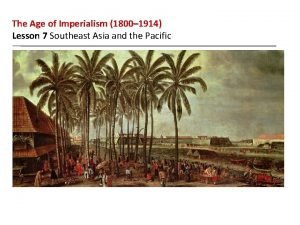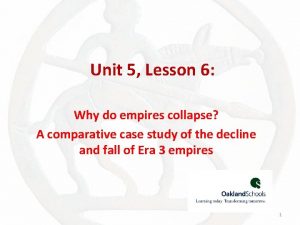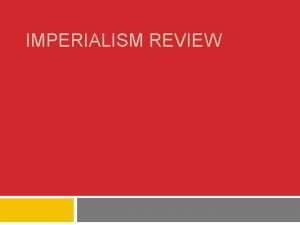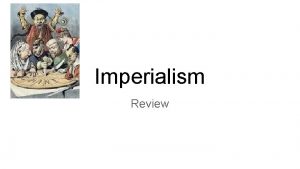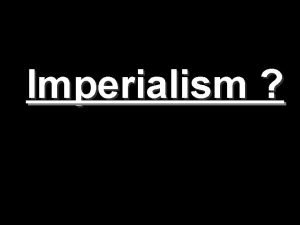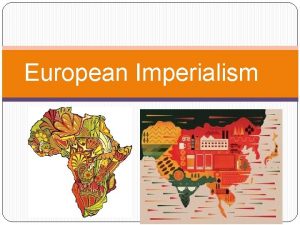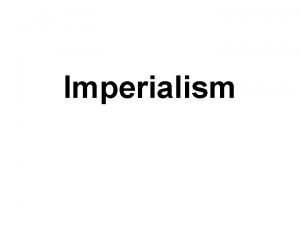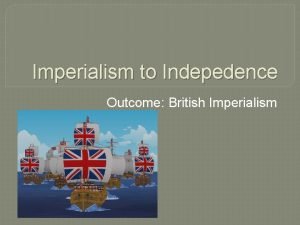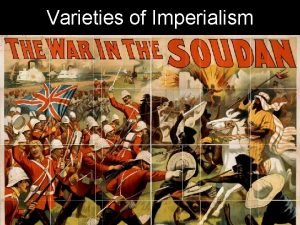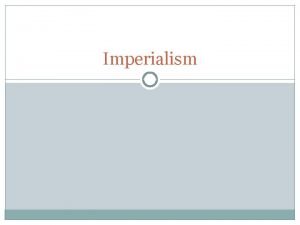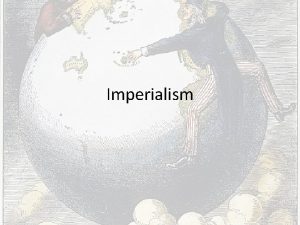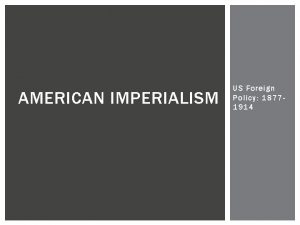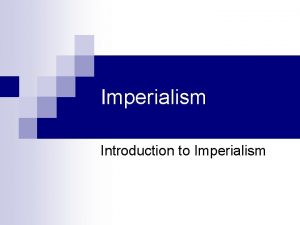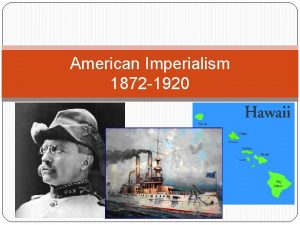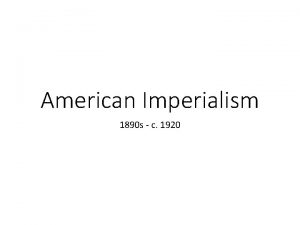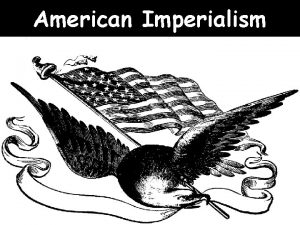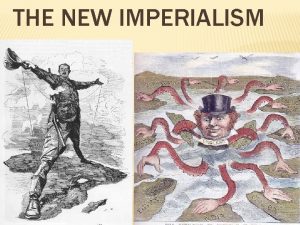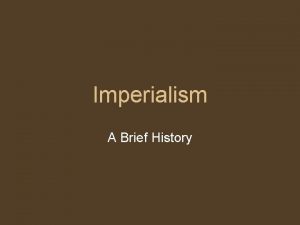Unit 4 Imperialism Review Imperialism What is it

























- Slides: 25

Unit 4 Imperialism Review

Imperialism What is it? When a stronger country dominates and controls a weaker country economically, politically, and socially. What does a country need first to imperialize? Countries need to be industrialized (star it, underline it, circle it, highlight it, know it) in order to take over another country.

Why would a country do that? ? ? Countries want additional natural resources. They also want additional markets to sell their goods. How are countries able to take over other countries? Superior technology What are some areas of the world that have been imperialized? Africa, China, and India

White Man’s Burden The 19 th Century term the “White Man’s Burden” reflects the idea that: Europeans had a responsibility to improve the lives of the colonial people.

Take up the White Man's burden-The savage wars of peace-Fill full the mouth of Famine And bid the sickness cease; And when your goal is nearest The end for others sought, Watch sloth and heathen Folly Bring all your hopes to nought. Take up the White Man's burden-Ye dare not stoop to less-Nor call too loud on Freedom To cloke your weariness; By all ye cry or whisper, By all ye leave or do, The silent, sullen peoples Shall weigh your gods and you. Take up the White Man's burden-Send forth the best ye breed-Go bind your sons to exile To serve your captives' need; To wait in heavy harness, On fluttered folk and wild-Your new-caught, sullen peoples, Half-devil and half-child. Take up the White Man's burden-No tawdry rule of kings, But toil of serf and sweeper-The tale of common things. The ports ye shall not enter, The roads ye shall not tread, Go mark them with your living, And mark them with your dead. Take up the White Man's burden-Have done with childish days-The lightly proferred laurel, The easy, ungrudged praise. Comes now, to search your manhood Through all the thankless years Cold, edged with dear-bought wisdom, The judgment of your peers! Take up the White Man's burden-In patience to abide, To veil the threat of terror And check the show of pride; By open speech and simple, An hundred times made plain To seek another's profit, And work another's gain. Take up the White Man's burden-And reap his old reward: The blame of those ye better, The hate of those ye guard-The cry of hosts ye humour (Ah, slowly!) toward the light: -"Why brought he us from bondage, Our loved Egyptian night? "

CAUSES OF NEW IMPERIALISM POLITICAL • OBTAIN LAND FOR MILITARY BASES • OBTAIN LAND FOR POWER & SECURITY • EMPIRE BUILDING • INCREASING NATIONALISM SOCIAL • SPREAD CHRISTIANITY • SPREAD WESTERN CULTURE • ETHNOCENTRIC - BELIEF THAT WESTERN WAYS WERE THE BEST ECONOMIC • NEEDED NATURAL RESOURCES • NEEDED NEW MARKETS TO SELL FINISHED GOODS • NEW PLACE FOR GROWING POPULATIONS TO SETTLE • PLACE TO INVEST PROFITS

Imperialism in India

Imperialism in India Great Britain imperialized India did not like the British and fought against them several times. Sepoy Mutiny – Indian troops revolted against the British because there were rumors that Sepoy bullets were greased with cow and pig fat. Muslims are forbidden to eat pork, and the cow is holy for Hindus. The revolt failed, but stirred feelings of NATIONALISM. Mohandas K. Gandhi – led a movement to remove the British out of India. • His belief was Non-Violent Civil Disobedience – resisting the British without fighting them. He encouraged protests and boycotts to get rid of the British. Did Gandhi succeed? • YES!!!! After several years, the British granted India independence in 1947.

India after independence • After WWII, Britain cannot hold onto its colonies • There is much violence between Hindus and Muslims • 1947 - India is partitioned into two separate nations India and Pakistan Hindu Population Muslim population


MOHANDAS K. GANDHI � (1869 -1948) Nationalist leader in India. Used non violence to gain India’s freedom From the British Empire. • • • Civil Disobedience Non-Cooperation Nationalist leader

Homespun movement � � He chose the traditional loincloth as a rejection of Western culture and a symbolic identification with the poor of India. Gandhi claimed that spinning thread in the traditional manner would create the basis for economic independence. This commitment to traditional cloth making was also part of a larger swadeshi movement, which aimed for the boycott of all British goods.

� The Salt March, was an act of civil disobedience led by Mohandas Gandhi (18691948) to protest British rule in India. During the march, thousands of Indians followed Gandhi to the Arabian Sea coast, a distance of some 240 miles. The march resulted in the arrest of nearly 60, 000 people, including Gandhi himself. India finally was granted its independence in 1947.

Imperialism in Africa

Scramble for Africa The Berlin Conference was a meeting of European countries that divided African land. There were no African representatives at this conference. - Split up African land based on physical barriers Divided African cultures Stole…took resources

African leaders breaking away from European Imperialism • • Created the Negritude movementfocused on promoting and encouraging all aspect of African culture. Senghor became the president in Independent Senegal. • Leader of the Mau rebels (resistance fighters) • Created pamphlets and articles about Kenyans under colonial rule. • Kenyatta became the president in Independent Kenya. • Promoted Pan. Africanism, a movement of cooperation between all African people to become independent from colonial rule • OAU organization of African unity, promoted equality, human rights, economic success for All Africans Imperialism lead to Nationalistic feelings because Africans increased the importance of their African culture, and united together to resist

Imperialism in China

IMPERIALISM IN CHINA � Opium War- 1839 Great Britain smuggles and sells opium (an addictive drug) to Chinese Citizens. China asks them to stop and they don’t. As a result, the two sides go to war. Britain has advanced technology and wins trading rights in China.

Impacts of the Opium War � Great Britain wins largely because of their superior technology. � China loses the city of Hong Kong until 1997.

IMPERIALISM IN CHINA � Isolationism ◦ Remaining to one’s own nation. The Chinese had a belief that they were ethnocentric. Losing the Opium wars forced China to abandon their ethnocentric beliefs and open itself up to trade with foreign nations. � Taiping Rebellion- 1850 -1864 ◦ Peasants revolt against the Chinese �Wanted to end poverty, and share wealth ◦ Chinese recruit foreign help � Boxer Rebellion- ◦ Secret organization ◦ Goal was to rid China of foreign influence

Imperialism in China- REVIEW � Boxer Rebellion – group of Chinese people that wanted to get rid of Western influence. They chanted “Death to Foreign Devils. ” The rebellion failed, but increased a sense of NATIONALISM among Chinese people


� � Sphere of Influence- An area of one country under the control of another. China is divided into 5 areas or spheres and each area has exclusive trading rights for the country that controls the sphere. Extraterritorial Rights-A policy that guaranteed European citizens in China were only subject to the laws of their own nation and could only be tried by their own courts. Open Door Policy-A policy of the United States that stated China should be open to all nations that which to trade with them. This policy did not include the consent of the Chinese, and was another form of imperialism.

Effects of Imperialism � Positives ◦ Increased sanitation & medical care/technology =longer life span ◦ Infrastructures & technologies were created (railroads, telegraph, roads, schools, hospitals) ◦ political and economic stability (democracy & competition) ◦ Nationalism increased and led to unification movements (independence from colonial rule)

Effects of Imperialism � Negative ◦ Loss of independence & culture ◦ Loss of life (disease, warfare) ◦ Local economies disrupted due to theft of natural resources and local products. ◦ Increased global competition among European countries (WWI)
 Unit 6 review questions
Unit 6 review questions Africa 1890
Africa 1890 Old imperialism examples
Old imperialism examples Algebra 2 unit test
Algebra 2 unit test Unit 5 lesson 7 the age of imperialism
Unit 5 lesson 7 the age of imperialism Chapter review motion part a vocabulary review answer key
Chapter review motion part a vocabulary review answer key Ap gov final review
Ap gov final review Nader amin-salehi
Nader amin-salehi What is inclusion and exclusion criteria
What is inclusion and exclusion criteria Narrative review vs systematic review
Narrative review vs systematic review Levels of organization in the human body
Levels of organization in the human body Unit 9 factoring review answers
Unit 9 factoring review answers Unit 8 review geometry
Unit 8 review geometry Unit 8 exponential and logarithmic functions
Unit 8 exponential and logarithmic functions Unit 7: lesson 5 - review questions
Unit 7: lesson 5 - review questions Unit 5: lesson 6 - review questions
Unit 5: lesson 6 - review questions Ap biology chapter 4 review
Ap biology chapter 4 review Latwral area
Latwral area Chemistry semester 2 review unit 12 thermochemistry
Chemistry semester 2 review unit 12 thermochemistry Khubris
Khubris Apush unit 3 review
Apush unit 3 review Hvac unit 31
Hvac unit 31 Unit test hamlet
Unit test hamlet Chemistry review answer key
Chemistry review answer key Geometry semester 2 bingo review
Geometry semester 2 bingo review Unit 6 apush review
Unit 6 apush review




